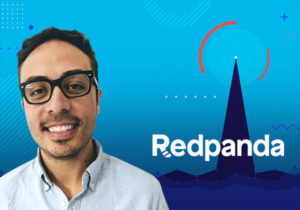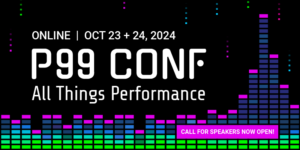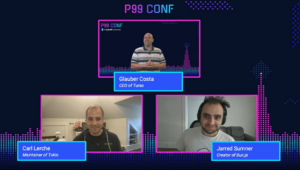Listen in as two technical founders Peter Zaitsev (Percona) & Alex Gallego (Redpanda) chat about open source, Rust vs C++ frameworks, and coding as a CEO
P99 CONF is not just an event; it’s a community. And the fact that it’s virtual makes it easier to bring great minds together for candid conversation – the “hallway moments” that were once restricted to those who happened to be in the same physical location at the same time.
Case in point: the moment at P99 CONF 2022 when we were fortunate enough to get Peter Zaitsev and Alex Gallego on the same virtual stage. Peter, founder and former CEO of Percona, and Alex, founder and current CEO of Redpanda, have a lot in common. Open source enthusiasts…Performance-obsessed…Respected entrepreneurs…Deeply technical…and great supporters of the P99 CONF/ScyllaDB communities from the very start.
We’re excited to release this video capturing the discussion that ensued when these two leaders got together to chat. And we’re also thrilled to be continuing the discussion at P99 CONF 2023: Peter will be returning to speak about “MySQL Performance on Modern CPUs: Intel vs AMD vs ARM” and Redpanda, represented by engineer John Spray, will be covering “Adventures in Thread-per-Core Async with Redpanda and Seastar.”
A Tour of the Talk
00:29 Why watch Alex’s P99 CONF tech talk (link below)
02:27 Why watch Peter’s P99 CONF tech talk (link below)
04:03 Why Seastar, not Rust? (Alex)
08:07 Moving from founder + CEO to founder (Peter)
09:23 Lessons learned being a CEO (Peter)
11:24 Managing the business vs. being a technologist (Alex)
13:27 Open source licensing (Peter)
Teasers
Here’s a taste of where the conversation turns:
On how the CEO job changes as the startup evolves (Peter)
Peter: It’s been interesting for me to see how the CEO job changes. Especially if you’re starting from the ground up, you start by having to do everything pretty much by yourself, then you expand and you eventually grow to a point where you have indirect leadership – when you set the vision, but you let your executive team make their own decisions and you accept that they are much better than you are in the things that they’re responsible for. If they’re not, then you’re probably hiring the wrong people. This also means that certain people who are well suited for an organization at one level might not be a great fit at the later levels. Some people will be able to grow with organizations, but others just don’t want to do what larger organizations require, don’t want to maintain that ultimate responsibility for the whole group. Having stepped back from the CEO role myself, I’m an example of that. [read more from Peter on this shift]
How to balance managing the business and still being a technologist (Alex)
I really stopped writing code around last year, but I still review code so I can speak intelligently about the technology that we’ve built and so I can feel like there’s still goodness in me. 😉 It’s something I felt that I was really competent at, and it’s hard to transition out of it. I still read pull requests of the major features, I read all of the RFCs and the design documents because it’s my job to explain to the world what the company is doing. Oh, and I’m writing Python models right now for pricing, but I no longer write eventing frameworks.
On open source licensing (Peter)
Percona was started with a slightly different premise than many other companies in this space. It’s important to point out that we are not a venture-funded company. We decided that we’re going to remain a customer-funded company. And the idea behind Percona was that we were going to stick to open-source licensing then grow as far and as fast as the market allows. It took us 16 years to reach the position where we are. I think that’s different from many other companies which, based on their funding model, need to maximize growth – so decided that if they have to abandon open source licenses to do that, well, so be it. For me and for Percona, I think open-source licensing is the right thing to do. I’m proud of what we have been able to achieve by following this route.
Why Seastar, not Rust? (Alex)
I think today Seastar is the best event framework that exists. When I started prototyping with the ideas of what would eventually be Redpanda, I tried Rust – and I found some compiler bugs, I also found compiler bugs in the C++ compiler, especially with lambda captures, and trying to push the latest features of C++. But, at the time, it was really refreshing to want to build this storage engine on a framework that was already battle-tested for storage engines. With this event framework, things like slow leaks will cost OOMs, potentially like unavailability sessions. ScyllaDB has been running the storage engine on Seastar for something like eight years. Redpanda has been running on its storage engine on Seastar for three and a half years. And then you have Ceph, which has been writing a new storage engine on top of Seastar for around two to four years.
When you have multiple storage engines, stressing the same small subset of features, you know that the majority of use cases are tested, by us, by Ceph, or by ScyllaDB. That’s why I still think that Seastar is the best framework that exists today. If there was a system or storage engine that had a really good eventing framework that was in Rust, I would reconsider that. But today, I still think that Seastar is the best that exists in the world.
Tech Talks On-Demand, and Live at P99 CONF 2023
The tech talks by Peter and Alex, and scores of other top engineers are now available on-demand.

Removing Implicit Deadlocks on a Thread-per-core Architecture with 2-phase Processing: Alex shows how implicit limitations in asynchronous programming can be addressed by a 2-phase technique for resolving priority inversion. |
A Deep Dive into Query Performance: Peter explores overlooked and underappreciated ways to successfully establish a connection and get results to the queries promptly and with correct results. |
And you can also catch 50+ new tech talks at P99 CONF 2023. Rust, C++, Go, Zig, event streaming architectures, distributed databases, Linux kernel, observability, k8s & more– it’s all on the agenda.
- Discover expert strategies from engineers at Netflix, TikTok, Twitter, Square, Google, Meta, Uber, Lyft, Red Hat, SUSE, ShareChat, RazorPay, AWS, Microsoft, and more.
- Explore low-latency engineering from multiple perspectives – programming languages, front-ends, back-ends, infrastructure, and tooling.
- Learn from luminaries like Jens Axboe, Bryan Cantrill, Gwen Shapira, Liz Rice, Avi Kivity, Glauber Costa, Armin Ronacher, Jon Haddad, Tanel Poder, Emily Gorcenski & Steven Rostedt.









